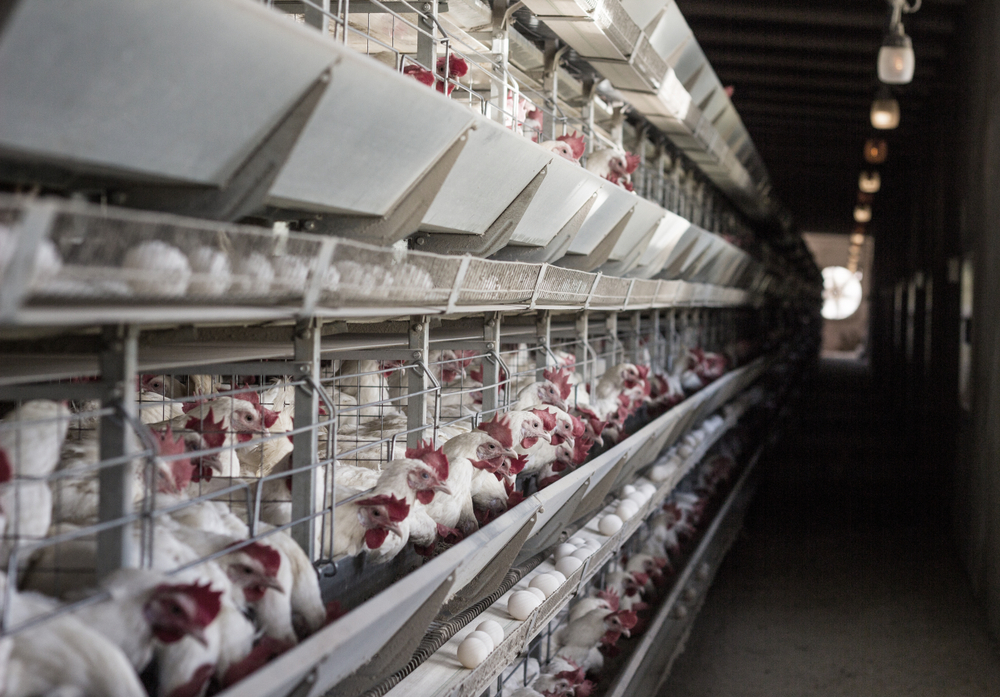Cory Booker Announces Legislation to Scale Back Factory Farms
It also aims to protect the farmers who contract with large agribusiness.
Cory Booker Announces Legislation to Scale Back Factory Farms
It also aims to protect the farmers who contract with large agribusiness.

Senator Cory Booker, who has been a vegan since 2014, announced the Farm System Reform Act of 2019 Monday morning.by Michael F. Hiatt on Shutterstock
Senator Cory Booker, New Jersey’s junior senator and a Democratic presidential hopeful, has unveiled a bill aimed at reducing the impact of factory farms.
The bill, titled the Farm System Reform Act of 2019, specifically focuses on concentrated animal feeding operations, or CAFOs, which is a definition used by the USDA that’s roughly similar to the general concept of factory farms. The bill would place a moratorium on the creation of any new CAFOs and also seek to protect the farmers that work in them.
A CAFO is defined by the USDA as having a particular number of confined animals per year. It comes out to a thousand cattle, 700 dairy cows, 2,500 hogs, 125,000 chickens, or 82,000 egg-laying hens. CAFOs have become synonymous with the worst of American agriculture: they generate obscene amounts of manure and waste, which is frequently linked to damage in nearby environments; they are often connected with disastrous animal welfare records; and farmers locked into CAFOs have little control over their operations thanks to opaque binding contracts with the largest livestock producers.
The new bill would create a block on the creation of any new CAFOs, and would create a program of $100 billion over ten years to entice farmers to leave the CAFO system. According to Booker’s press release, it would also “hold corporate integrators responsible for pollution and other harm caused by CAFOs,” which would be a complicated mess to untangle, as there are many laws on the books designed to protect these corporations.

There are also some protections for the actual farmers who work at CAFOs; largely, these are theoretically independent operations that contract with one of a very small handful of giant corporations. These corporations have all the power to dictate exactly how the animals will be raised and how much the farmer will be paid, and have the ability to essentially shut down any farm simply by not renewing a contract. Booker’s bill would prohibit ranking systems used by poultry corporations in which any raise for one farmer results in a pay decrease for the others.
The bill also, in what’s only really tangentially related, would bring back country-of-origin labeling, which was repealed in late 2015. These labels would require meat processors to label where the product was raised, slaughtered, and packaged. Currently, beef that was raised and slaughtered in Brazil, but packaged in the United States, can be labeled as “Made in the USA,” a loophole that has been lambasted by many. The big producers love that loophole, but it’s certainly anything but transparent.
The bill has endorsements from largely progressive public health, food safety, and farm union groups, including the Center for Food Safety, Natural Resources Defense Council, and Family Farm Action.
Follow us
This work is licensed under a Creative Commons Attribution-NoDerivatives 4.0 International License.
Want to republish a Modern Farmer story?
We are happy for Modern Farmer stories to be shared, and encourage you to republish our articles for your audience. When doing so, we ask that you follow these guidelines:
Please credit us and our writers
For the author byline, please use “Author Name, Modern Farmer.” At the top of our stories, if on the web, please include this text and link: “This story was originally published by Modern Farmer.”
Please make sure to include a link back to either our home page or the article URL.
At the bottom of the story, please include the following text:
“Modern Farmer is a nonprofit initiative dedicated to raising awareness and catalyzing action at the intersection of food, agriculture, and society. Read more at <link>Modern Farmer</link>.”
Use our widget
We’d like to be able to track our stories, so we ask that if you republish our content, you do so using our widget (located on the left hand side of the article). The HTML code has a built-in tracker that tells us the data and domain where the story was published, as well as view counts.
Check the image requirements
It’s your responsibility to confirm you're licensed to republish images in our articles. Some images, such as those from commercial providers, don't allow their images to be republished without permission or payment. Copyright terms are generally listed in the image caption and attribution. You are welcome to omit our images or substitute with your own. Charts and interactive graphics follow the same rules.
Don’t change too much. Or, ask us first.
Articles must be republished in their entirety. It’s okay to change references to time (“today” to “yesterday”) or location (“Iowa City, IA” to “here”). But please keep everything else the same.
If you feel strongly that a more material edit needs to be made, get in touch with us at [email protected]. We’re happy to discuss it with the original author, but we must have prior approval for changes before publication.
Special cases
Extracts. You may run the first few lines or paragraphs of the article and then say: “Read the full article at Modern Farmer” with a link back to the original article.
Quotes. You may quote authors provided you include a link back to the article URL.
Translations. These require writer approval. To inquire about translation of a Modern Farmer article, contact us at [email protected]
Signed consent / copyright release forms. These are not required, provided you are following these guidelines.
Print. Articles can be republished in print under these same rules, with the exception that you do not need to include the links.
Tag us
When sharing the story on social media, please tag us using the following: - Twitter (@ModFarm) - Facebook (@ModernFarmerMedia) - Instagram (@modfarm)
Use our content respectfully
Modern Farmer is a nonprofit and as such we share our content for free and in good faith in order to reach new audiences. Respectfully,
No selling ads against our stories. It’s okay to put our stories on pages with ads.
Don’t republish our material wholesale, or automatically; you need to select stories to be republished individually.
You have no rights to sell, license, syndicate, or otherwise represent yourself as the authorized owner of our material to any third parties. This means that you cannot actively publish or submit our work for syndication to third party platforms or apps like Apple News or Google News. We understand that publishers cannot fully control when certain third parties automatically summarize or crawl content from publishers’ own sites.
Keep in touch
We want to hear from you if you love Modern Farmer content, have a collaboration idea, or anything else to share. As a nonprofit outlet, we work in service of our community and are always open to comments, feedback, and ideas. Contact us at [email protected].by Dan Nosowitz, Modern Farmer
December 16, 2019
Modern Farmer Weekly
Solutions Hub
Innovations, ideas and inspiration. Actionable solutions for a resilient food system.
ExploreShare With Us
We want to hear from Modern Farmer readers who have thoughtful commentary, actionable solutions, or helpful ideas to share.
SubmitNecessary cookies are absolutely essential for the website to function properly. This category only includes cookies that ensures basic functionalities and security features of the website. These cookies do not store any personal information.
Any cookies that may not be particularly necessary for the website to function and are used specifically to collect user personal data via analytics, ads, other embedded contents are termed as non-necessary cookies.
As a retired farmer I would really like to know what classifies as a factory farm Example,farmer has two kids that go off to college and want to come home after graduation. It only took about 200 cows to raise 2 kids while his wife worked in town for health insurance. Noe that the kids have come back to the family farm it now takes 1,000 cows to feed these families on this family farm. To take advantage of tax law they decide to incorporate. Do you now consider this a factory farm. I think not. What if it was… Read more »